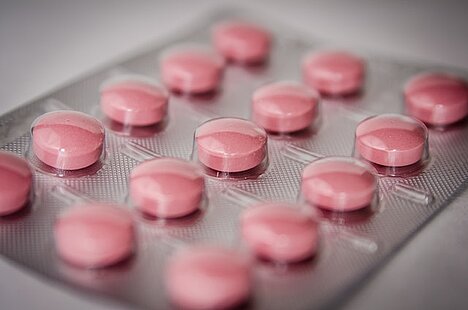Zinc

How much zinc does your dog need?
The optimum amount of zinc for your dog depends on various factors, such as his age, size, state of health and diet. The German Nutrition Society (DGE) recommends a daily zinc intake of 2 to 5 milligrams per kilogram of body weight for adult dogs. The requirement may be higher for puppies, pregnant and nursing bitches and dogs with certain diseases. To determine your dog's exact zinc requirements, you should consult your vet or a nutritionist.
What are the benefits of zinc for your dog?
Zinc has many positive effects on your dog's health. Here are some of them:
- Zinc strengthens the immune system and helps your dog fight off infections.
- Zinc promotes your dog's skin health and coat quality. It helps regenerate skin cells and protects against inflammation, itching and dandruff.
- Zinc supports wound healing and blood clotting. It is involved in the formation of collagen, an important structural protein for connective tissue.
- Zinc regulates your dog's metabolism and hormone production. It is important for the function of the thyroid gland, adrenal glands and reproductive organs.
- Zinc improves your dog's eyesight and hearing. It is involved in the formation of retinol, a vitamin A derivative that is necessary for seeing in the dark. It also protects the hair cells in the inner ear from damage caused by noise or ageing.
What are the disadvantages of too much or too little zinc for your dog?
As with many other nutrients, the same applies to zinc: the right amount makes all the difference. Too much or too little zinc can lead to health problems for your dog. Here are some of them:
- Too little zinc can lead to a zinc deficiency, which can manifest itself in a variety of symptoms. These include hair loss, skin changes, loss of appetite, weight loss, diarrhea, susceptibility to infections, growth disorders and behavioral problems.
- Too much zinc can lead to zinc poisoning, which can be life-threatening. The most common cause of this is the consumption of zinc-containing objects such as coins, screws or batteries. Symptoms of zinc poisoning can include vomiting, diarrhea, anemia, liver and kidney damage and neurological disorders.
How can you optimize your dog's zinc intake?
To ensure your dog has a sufficient and balanced supply of zinc, you should pay attention to a few points:
- Feed your dog a high-quality food that contains all the necessary nutrients. Pay attention to the manufacturer's instructions regarding the recommended amount of food and the composition of the food.
- If necessary, supplement your dog's food with natural sources of zinc such as meat, fish, eggs or dairy products. You can also use special zinc supplements, which are available from pharmacies or specialist retailers. However, follow the dosage instructions and consult your vet or nutritionist before giving your dog extra zinc.
- Avoid giving your dog foods that can inhibit zinc absorption. This includes, for example, cereal products that contain phytic acid or dairy products that contain calcium. These substances can bind with zinc and reduce its availability to the body.
- Keep your dog away from objects containing zinc that he could swallow. Keep such items out of his reach and regularly check his toys for possible sources of zinc.
Zinc is an essential trace element for your dog that fulfills many important functions in the body. A sufficient and balanced supply of zinc can promote your dog's health and well-being. To achieve this, you should follow the recommendations of your vet or nutritionist and pay attention to the quality and composition of the food. You should also protect your dog from possible sources of zinc that could lead to an overdose.
Properties 3
Are you looking for other ingredients with a specific property?
Just click on them to find more.
If you notice any signs of hypersensitivity or poisoning in your dog, you should see your vet immediately. We are not a substitute for a vet, but we try to be as accurate as possible. Every dog reacts differently and we recommend you get a second opinion or consult your vet if in doubt.
Stay healthy and take good care of your four-legged friend!😊